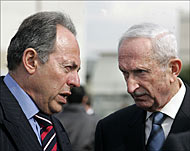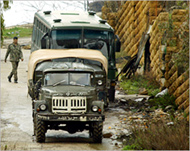Lebanon fails to announce new leaders
Lebanese leaders have failed to announce a long-awaited new government after a marathon meeting, still unable to break over a month of political stalemate before elections planned for May.

Prime Minister-designate Umar Karami and parliament Speaker Nabih Birri left the presidential palace without speaking to reporters after a meeting of four hours and 50 minutes with President Emile Lahud.
A senior official who earlier said the formation of a 30-member cabinet was imminent, later said the meeting had ended and more consultations were needed.
Karami will probably have to consult with the Ain al-Tina gathering of pro-Syrian parties, the official said.
“There are points that still need to be resolved. They mostly centre on political demands linked to cabinet portfolios and power share, with the electoral law being part of all the issue,” he said.
The pro-Syrian Karami was reappointed prime minister a month ago after he resigned in the face of massive opposition protests over the 14 February assassination of his popular predecessor and construction tycoon Rafiq al-Hariri.
Emerging problems
Karami said at the weekend he was due to meet Lahud early on Monday to announce the new government, but the meeting was delayed until the afternoon by last-minute squabbling over cabinet posts and the law to set the framework for the polls due by the end of May.
Two ministers from Karami’s outgoing pro-Syrian cabinet have announced they do not want to join the next administration.
Other problems emerged after Lahud and outgoing Interior Minister Sulaiman Franjiya objected to Karami’s plan to submit to parliament a new law to expand electoral constituencies.
 |
|
Lahud (L) has objected to a bid to |
Lahud, Franjiya and their Christian community’s influential spiritual guide, Maronite Cardinal Nasr Allah Sufair, are instead backing smaller constituencies that would be more representative for minorities.
Outdated formula
Pro-Syrian parliamentary blocs are opposed to demands, particularly from the Christian opposition, for a new law based on smaller constituencies and in favour of larger districts as stipulated by the constitution.
Nassib Hutait, a senior official of the pro-Syrian Amal movement, said the formula of smaller constituencies was obsolete.
On Saturday, prominent opposition leader and Druze MP Walid Jumblatt called for a law guaranteeing small constituencies, but predicted that the opposition would win under any kind of legislation in elections for the 128-member parliament.
Jumblatt also rejected any delay in the elections.
Syria, meanwhile, accelerated its troop pullout from the Bekaa Valley of eastern Lebanon in line with its decision to complete its withdrawal from Lebanon by a 30 April deadline, agreed with the United Nations.
Syrian military intelligence agents evacuated a position in the village of Mashghara in southeast Lebanon.
 |
|
Syria’s evacuation is on track to |
The troops dismantled and left five positions in the Qaraun region, from where 40 military vehicles were seen carrying soldiers and equipment towards the Masna crossing point into Syria.
Flawed inquiry
The pullout was in line with UN Security Council Resolution 1559, passed last September and which demanded the withdrawal of all foreign troops from Lebanon.
The Security Council on Thursday passed Resolution 1595 to set up an inquiry commission to probe al-Hariri’s murder, which Lebanon’s opposition blamed on the government and their political masters in Damascus, triggering strong denials.
Resolution 1595 came after a UN fact-finding mission into the assassination found that Lebanon’s own investigation was flawed.
The UN team also criticised Damascus for creating a climate of tension ahead of the huge blast on the Beirut seafront that killed al-Hariri and 19 other people.